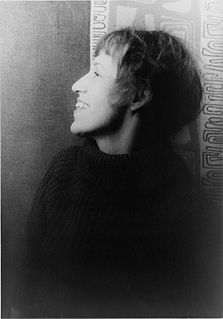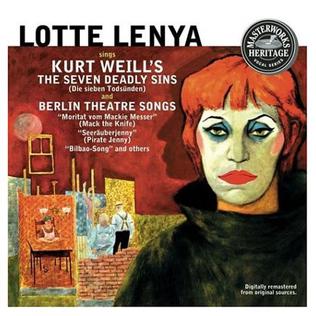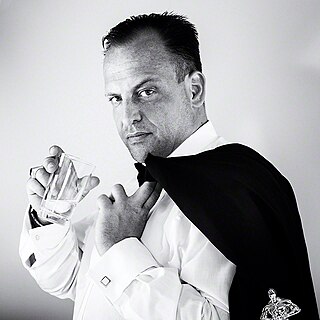Lotte Meyer (22 February 1909 - 7 June 1991) was a German stage and screen actress. [1]
Lotte Meyer (22 February 1909 - 7 June 1991) was a German stage and screen actress. [1]
Lotte Meyer was born in Bremen. She was born into a theatre family. During the nineteenth century her grandparents had run their own theatre company based in Merseburg, and which had toured across Germany, Russia, Austria and Switzerland. He mother, born Fanny Musäus, was a stage actress who had learnt her profession from her own parents. Alfred Meyer, Lotte Meyer's father, was a stage actor and comedian. Preparing to follow in the family tradition, she took acting lessons from Alice Verden at the Dresden State Theatre (Staatstheater). [1]
Meyer was just 19 when she made her stage debut, playing "Lucy", the daughter of the police chief, in Leopold Jessner's production of The Threepenny Opera at Chemnitz. After that she had a successful stage career at the Dresden State Theatre (Staatstheater) between 1930 and 1935. Her sons Christoph and Peter were born in 1937 and 1940: she took a break from her stage work till 1945. [1] Sources are silent about Mr. Schroth, the boys' father. After Lotte Meyer returned to the stage in 1945, her two sons shared their mother's itinerant theatrical lifestyle as they grew up. [2] [3]
Returning to the stage in 1945 she became part of the group around Erich Ponto, supporting his efforts to rebuild the "Staatsschauspiel" theatre in Dresden and resume its theatrical traditions. She also appeared at the city's newly founded "Komödienhaus" (loosely, "Comedy Theatre"). [1] The central third of Germany, including Dresden, had ended the war administered as the Soviet occupation zone, to be relaunched in October 1949 as the Soviet-sponsored German Democratic Republic (East Germany). It was in East Germany that Lotte Meyer now built her career. Towards the end of the 1940s she began to travel around more (always within East Germany), appearing at theatres in Stralsund, Schwerin and then, via Eisenach, joining the Berlin-based Berliner Ensemble theatre company. [1] Here she worked with Bertolt Brecht, a convinced Marxist who remained an iconic figure for the political left even if he was by now becoming a thorn in the side of the "Marxist" East German Politburo. For Meyer, work with Brecht was a constant learning opportunity. [1]
Later she appeared at Erfurt, at the Theatre of the Young Generation in Dresden, the (East) German National Theatre in Weimar and at the Maxim Gorki Theatre in Berlin. In 1951, while Brecht was still very much alive, she took the lead as "Pelagea Vlassova" in Die Mutter ("The Mother") in the playwright's own production at the "Deutsches Theater". Other roles for which Meyer is remembered include that of "Lyubov Ranevskaya", the lynch pin character in The Cherry Orchard, Mrs. Alving in Ibsen's Ghosts and the title role in Helmut Baierl's "Mrs. Flinz". There were many more major character roles, generally from the more serious end of the theatrical canon. [1]
Lotte Meyer returned to Dresden in 1967, meaning that her career had both its beginnings and its endings at the Dresden State Theatre (Staatstheater). This was also where her father had enjoyed his greatest comedic stage triumphs. She remained closely involved with the Dresden theatre till shortly before her death. She was much loved by comrade thespians, and during the immediate run-up to the changes which heralded the beginnings of a democratic East German state and then, half a year later, reunification, Meyer's apartment was used as a meeting point for many members of the "Dresden ensemble" community. Her home was also the scene of various round-table-style meetings, discussing art, politics and the methodologies of the theatrical profession, with a focus on how the situation in East Germany might be changed. Participants included Meyer's own grandchildren and frequently also took place in the presence of her most important friend, the Dresden artist Christoph Wetzel. [1]
Her stage appearances during this later stage in her career tended still to focus on "character roles" such as Marthe Bull ("Mother") in Kleist's The Broken Jug. It was only towards the very end of her career that Meyer took on some significant film roles, notably in "Die gestundete Zeit" (loosely, "Time deferred"), a film for television directed in 1989 by Bernd Böhlich. She also appeared two years later in Böhlich's "Kein Wort Einsamkeit" (loosely, "Not a word about loneliness"), another television. Her final film appearance came only in late 1991 or early 1992, by which time she had died. This time she featured in Ula Stöckl rendition of "Das alte Lied" ("The Old Song"). [1]
Lotte Meyer died in Dresden. Her ashes were laid to rest at the city's Urnenhain Tolkewitz garden of rest.

Lotte Lenya was an Austrian-American singer, diseuse, and actress, long based in the United States. In the German-speaking and classical music world, she is best remembered for her performances of the songs of her first husband, Kurt Weill. In English-language cinema, she was nominated for an Academy Award for her role as a jaded aristocrat in The Roman Spring of Mrs. Stone (1961). She also played the murderous and sadistic Rosa Klebb in the James Bond movie From Russia with Love (1963).

Siegfried Matthus was a German composer, conductor, and festival founder and manager. Some of his operas, such as Judith, were premiered at the Komische Oper Berlin in East Berlin. In 1991, he founded the chamber opera festival Kammeroper Schloss Rheinsberg and directed it until 2018. In 2005, he composed a Te Deum for the reopening of the Dresden Frauenkirche. Matthus is considered one of Germany's most often performed contemporary composers.
Harry Alfred Robert Kupfer was a German opera director and academic. A long-time director at the Komische Oper Berlin, he worked at major opera houses and at festivals internationally. Trained by Walter Felsenstein, he worked in the tradition of realistic directing. At the Bayreuth Festival, he staged Wagner's Der fliegende Holländer in 1978 and Der Ring des Nibelungen in 1988. At the Salzburg Festival, he directed the premiere of Penderecki's Die schwarze Maske in 1986 and Der Rosenkavalier by Richard Strauss in 2014.

The Seven Deadly Sins is a satirical ballet chanté in seven scenes composed by Kurt Weill to a German libretto by Bertolt Brecht in 1933 under a commission from Boris Kochno and Edward James. It was translated into English by W. H. Auden and Chester Kallman and more recently by Michael Feingold. It was the last major collaboration between Weill and Brecht.

Ruth Berghaus was a German choreographer, opera and theatre director, and artistic director.
Susan Owen is an American operatic soprano. Born in Salisbury, North Carolina, she earned a Bachelor of Music degree from East Carolina University in 1980 and a Master of Music degree from the University of Texas at Austin in 1983. In 1990 she won the Metropolitan Opera National Council Auditions. From 1995 to 1999 she was a member of the Staatstheater Kassel, Intendant Michael Leinert. From 1999 to 2002 she was a member of the Staatstheater Darmstadt with Mark Albrecht.
Katharina "Käthe" Dorsch was a German stage and film actor.

Friederike Caroline Neuber, née Friederike Caroline Weissenborn, also known as Friedericke Karoline Neuber, Frederika Neuber, Karoline Neuber, Carolina Neuber, Frau Neuber, and Die Neuberin, was a German actress and theatre director. She is considered one of the most famous actresses and actor-managers in the history of the German theatre, "influential in the development of modern German theatre." Neuber also worked to improve the social and artistic status of German actors and actresses, emphasizing naturalistic technique. During a time when theatrical managers in Germany were predominantly men, Caroline Neuber stands out in history as a remarkably ambitious woman who, during her 25-year career, was able to alter theatrical history, elevating the status of German theatre alongside of Germany's most important male theatrical leaders at the time, such as "her actor-manager husband Johann, the popular stage fool Johann Müller, the major actor of the next generation Johann Schönemann, the multi-talented newcomer Gotthold Ephraim Lessing, and principally, their de facto Dramaturg, Johann Gottsched."

Eugen Berthold Friedrich Brecht, known professionally as Bertolt Brecht, was a German theatre practitioner, playwright, and poet. Coming of age during the Weimar Republic, he had his first successes as a playwright in Munich and moved to Berlin in 1924, where he wrote The Threepenny Opera with Kurt Weill and began a lifelong collaboration with the composer Hanns Eisler. Immersed in Marxist thought during this period, he wrote didactic Lehrstücke and became a leading theoretician of epic theatre and the Verfremdungseffekt.
Carmen Reppel is a German soprano active in both opera and concert. A member of the Staatstheater Hannover, she had a major international career, appearing in leading roles in over 60 operas. She also explored lesser-known repertoire such as Siegfried Wagner's Schwarzschwanenreich and appeared in contemporary operas, singing in world premieres of operas by Aribert Reimann and Flavio Testi. She is known for her parts in the Jahrhundertring, the centenary production of Wagner's Der Ring des Nibelungen at the Bayreuth Festival, including the filmed version of 1980.

Urs Rechn is a German actor, most famous for his appearance in the 2015 Cannes Grand Prix-winning Holocaust drama Son of Saul.
Evelyn Herlitzius is a German opera singer, a dramatic soprano. She is known for performing major roles in works by Richard Wagner and Richard Strauss, such as Brünnhilde, Isolde and Elektra, at the Semperoper, the Bayreuth Festival and leading European opera houses.

Sonja Kehler was a German actress and chanson singer, known internationally for her interpretation of works by Bertolt Brecht, first playing his characters on the theatre stage, then focused on singing his songs and those of others in solo programs. She also taught acting in Danish at the theatre academy in Odense, appeared in films, worked as stage director and presented literary programs.
Lioba Braun is a German opera singer and academic teacher at the Hochschule für Musik und Tanz Köln and the Hochschule für Musik und Theater München. Based at the Nationaltheater Mannheim, she has appeared mostly in mezzo-soprano parts at major opera houses and festivals. She became internationally known appearing as Brangäne at the Bayreuth Festival in 1994, and performed the soprano part of Isolde on stage first in 2012.
Bertlies "Lys" Symonette was a German-American pianist, chorus singer and musical stage performer. In 1945 she took a job as rehearsal pianist, coach, understudy or multi-tasking "swing-girl" for The Firebrand of Florence, a Kurt Weill musical making its Broadway debut. This proved to be the start of a new career as Weill's musical assistant: from that point a principal focus of her professional life was on the composer and, more particularly after his early death in 1950, the career of his widow, the stage performer Lotte Lenya. When Lenya died, in 1981, Lys Symonette was appointed vice-president of the Kurt Weill Foundation, also serving as its "musical executive". When she died her friend and frequent collaborator, Prof. Kim H. Kowalke, published an affectionate tribute in which he described her as "the last and irreplaceable link to the inner artistic circle of Weill and Lenya".
Günter Krämer is a German stage director, especially for opera, and a theatre manager who has staged internationally.

The Staatstheater Cottbus is the only state theatre of the German federal state of Brandenburg in Cottbus. It has its own ensemble presenting plays, operas, operettas, musicals, orchestral concerts and ballet. The theatre had more than 130.000 spectators in 2013.

Peter Palitzsch was a German theatre director. He worked with Bertolt Brecht in his Berliner Ensemble from the beginning in 1949, and was in demand internationally as a representative of Brecht's ideas. He was a theatre manager at the Staatstheater Stuttgart and the Schauspiel Frankfurt. Many of his productions were invited to the Berliner Theatertreffen festival. He worked internationally from 1980.
Julia Bauer is a German operatic coloratura soprano who has appeared at major opera houses and also in concert and recital. She has had leading roles such as Zerbinetta and Lulu, and was Freia, Helmwige, Forest Bird, Woglinde and Third Norn in Der Ring in Minden.

Hans Otto Theater, named after the actor Hans Otto, is a Potsdam municipal theatre. Its headquarters and main venue is in the Großes Haus am Tiefen See in Potsdam's cultural district on Schiffbauergasse. Other regular venues are the neighbouring historic Reithalle and occasionally the Palace Theatre in the Neues Palais.